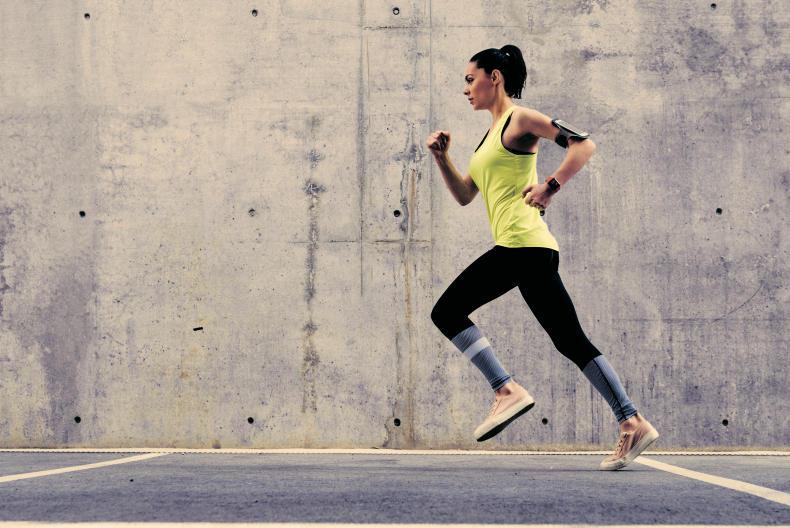If you’ve made it through January in-keeping with the health goals you set in the new year, perhaps it was with the help of an app on your mobile device. Despite the many positive reviews fitness and weight-loss apps receive online and in the media, a recent study has found potential problems regarding the psychological wellbeing of those who use them regularly. Conducted by the JE Carnes school of business at NUI Galway, the study was mainly focused on apps that publicly share exercise data with followers.
Peter Ryan is a Paralympian cyclist from Upperchurch, Co Tipperary, and is currently training for the 2020 Paralympics in Tokyo.

Tandem cyclist Peter Ryan and his pilot Sean Hahessy near Peter's home in Thurles \ Ramona Farrelly
He agrees with the findings of this study and generally avoids fitness apps; believing they may lead to obsessive behaviour.
“You can show your route, you can show how long [your workout] took – I don’t engage a whole pile with any of those (apps),” he says. “I know myself. You get hooked; guilt sets in for no reason whatsoever and you’re monitoring your whole day based on numbers and calories. It becomes an unhealthy relationship.”
Dr Eoin Whelan, who was lead author on the study, says that there can be benefits to using a fitness app, particularly if you’re rural-based and not using it competitively.

Dr Eoin Whelan conducted a study on fitness apps and psychological wellbeing.
“Fitness apps and sharing fitness data through online platforms like Strava and Runkeeper, can certainly help rural people who don’t have access to gyms to commence and sustain physical exercise,” he says. “What we found in our study of cyclists is that fitness apps can both benefit and harm psychological wellbeing, depending on the person’s motivation for sharing their workout data.”
“If their motivation is to encourage and support themselves and their community to exercise, then that has positive implications for wellbeing,” he continues. “But if their motivation is to seek attention and impress others with how far or fast they cycled or ran, that can lead to an obsession for physical exercise which ultimately harms psychological wellbeing.”
Registered dietician and communications manager of the Irish Nutrition and Dietetic Institute Louise Reynolds agrees with this assessment.

Registered dietician and communications manager for the Irish Nutrition and Dietetic Institute Louise Reynolds.
“[As dieticians], diet and fitness apps are not something we would be routinely recommending,” she says. “We do, however, recommend keeping a food diary – so from that point of view, when everything is on your phone or tablet, it can be a good way of checking in with yourself to see what you’re eating, when you’re snacking and keep records of how you’re doing.”
Reynolds also warns that using a diet app can lead to restrictive diets and she would instead encourage people to eat a variety of healthy foods from all food groups.
For country dwellers, fitness and weight-loss apps can act as a virtual personal trainer and help keep stricter diets on track.
The key to safe app use is to avoid publicly sharing workout data and to discontinue if the app is leading to any kind of obsessive behaviour.
Fitness and weight-loss apps can be downloaded onto your device through the Play Store if you use an Android device, or the App Store for Apple.
Noom
Noom is expensive (around €120 every four months), but claims impressive results. Originally used just for weight loss, the app is now getting involved in health maintenance for those who suffer from chronic health ailments, like type 2 diabetes.
Claiming to be more of a lifestyle than a diet, Noom aims to help you achieve weight-loss and fitness goals by building self-awareness around your bad habits and encouraging healthier ones.
The Ate App
Also known as the “Mindful Food Diary”, The Ate App is a free meal-logging tool you can download to your device. According to the website, this app is “visual, mindful and non-judgemental”, focusing instead on how the meals you’ve eaten make you feel.
Causing the user to contemplate the food they eat in a reflective way while tracking health goals, this app is a good alternative for those who may not be interested in losing weight, but eating more healthily.
MyFitnessPal
MyFitnessPal is one of the most widely used health apps in the world. The most popular option is free, which only tracks your calories, water intake and weight, suggesting a maximum amount of calories to consume per day to achieve your desired weight.
There is a premium version, which is €49.99 per year. This option offers increased analytics and exclusive content.
Strava
A free fitness app used to track running, cycling or swimming workouts, this is one of the apps featured in the study by NUI Galway. This app tracks every second of your workout using top technology; allowing you to completely analyse the workout afterwards.
Claiming to be the social network for athletes, Strava will record your workouts and add them to your feed where your friends can offer feedback and support.
If you’ve made it through January in-keeping with the health goals you set in the new year, perhaps it was with the help of an app on your mobile device. Despite the many positive reviews fitness and weight-loss apps receive online and in the media, a recent study has found potential problems regarding the psychological wellbeing of those who use them regularly. Conducted by the JE Carnes school of business at NUI Galway, the study was mainly focused on apps that publicly share exercise data with followers.
Peter Ryan is a Paralympian cyclist from Upperchurch, Co Tipperary, and is currently training for the 2020 Paralympics in Tokyo.

Tandem cyclist Peter Ryan and his pilot Sean Hahessy near Peter's home in Thurles \ Ramona Farrelly
He agrees with the findings of this study and generally avoids fitness apps; believing they may lead to obsessive behaviour.
“You can show your route, you can show how long [your workout] took – I don’t engage a whole pile with any of those (apps),” he says. “I know myself. You get hooked; guilt sets in for no reason whatsoever and you’re monitoring your whole day based on numbers and calories. It becomes an unhealthy relationship.”
Dr Eoin Whelan, who was lead author on the study, says that there can be benefits to using a fitness app, particularly if you’re rural-based and not using it competitively.

Dr Eoin Whelan conducted a study on fitness apps and psychological wellbeing.
“Fitness apps and sharing fitness data through online platforms like Strava and Runkeeper, can certainly help rural people who don’t have access to gyms to commence and sustain physical exercise,” he says. “What we found in our study of cyclists is that fitness apps can both benefit and harm psychological wellbeing, depending on the person’s motivation for sharing their workout data.”
“If their motivation is to encourage and support themselves and their community to exercise, then that has positive implications for wellbeing,” he continues. “But if their motivation is to seek attention and impress others with how far or fast they cycled or ran, that can lead to an obsession for physical exercise which ultimately harms psychological wellbeing.”
Registered dietician and communications manager of the Irish Nutrition and Dietetic Institute Louise Reynolds agrees with this assessment.

Registered dietician and communications manager for the Irish Nutrition and Dietetic Institute Louise Reynolds.
“[As dieticians], diet and fitness apps are not something we would be routinely recommending,” she says. “We do, however, recommend keeping a food diary – so from that point of view, when everything is on your phone or tablet, it can be a good way of checking in with yourself to see what you’re eating, when you’re snacking and keep records of how you’re doing.”
Reynolds also warns that using a diet app can lead to restrictive diets and she would instead encourage people to eat a variety of healthy foods from all food groups.
For country dwellers, fitness and weight-loss apps can act as a virtual personal trainer and help keep stricter diets on track.
The key to safe app use is to avoid publicly sharing workout data and to discontinue if the app is leading to any kind of obsessive behaviour.
Fitness and weight-loss apps can be downloaded onto your device through the Play Store if you use an Android device, or the App Store for Apple.
Noom
Noom is expensive (around €120 every four months), but claims impressive results. Originally used just for weight loss, the app is now getting involved in health maintenance for those who suffer from chronic health ailments, like type 2 diabetes.
Claiming to be more of a lifestyle than a diet, Noom aims to help you achieve weight-loss and fitness goals by building self-awareness around your bad habits and encouraging healthier ones.
The Ate App
Also known as the “Mindful Food Diary”, The Ate App is a free meal-logging tool you can download to your device. According to the website, this app is “visual, mindful and non-judgemental”, focusing instead on how the meals you’ve eaten make you feel.
Causing the user to contemplate the food they eat in a reflective way while tracking health goals, this app is a good alternative for those who may not be interested in losing weight, but eating more healthily.
MyFitnessPal
MyFitnessPal is one of the most widely used health apps in the world. The most popular option is free, which only tracks your calories, water intake and weight, suggesting a maximum amount of calories to consume per day to achieve your desired weight.
There is a premium version, which is €49.99 per year. This option offers increased analytics and exclusive content.
Strava
A free fitness app used to track running, cycling or swimming workouts, this is one of the apps featured in the study by NUI Galway. This app tracks every second of your workout using top technology; allowing you to completely analyse the workout afterwards.
Claiming to be the social network for athletes, Strava will record your workouts and add them to your feed where your friends can offer feedback and support.













SHARING OPTIONS